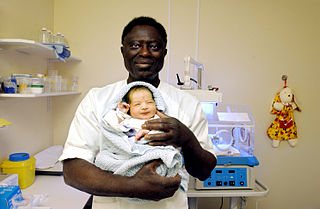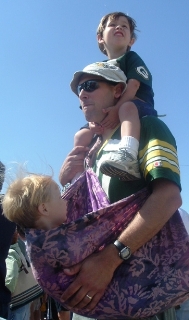External links
- Incite Pictures Site – Production Company Page/ Additional Resources
- Fatherhood USA at IMDb
| Fatherhood USA | |
|---|---|
| Directed by | Marion Lipschutz Rose Rosenblatt |
| Produced by | Marion Lipschutz Rose Rosenblatt |
| Narrated by | Bill Bradley |
Release date |
|
| Country | United States |
Fatherhood USA is a three-part mini-series originally broadcast nationally on PBS in 1998. It was produced and directed by Marion Lipschutz and Rose Rosenblatt of Incite Pictures. The program, hosted by Senator Bill Bradley, seeks to dispel common stereotypes of fatherhood, and examine how fathers are able to build strong relationships with their children.
The feature is broken into three segments:
This looks at low-income fathers, and is narrated by Yaphet Kotto. This section examines common stereotypes of fatherhood: absent fathers, unmarried fathers, deadbeat dads, and considers different ways in which fathers working against histories of fatherlessness, neglect, poverty, and incarceration can still remain present in the lives of their children.
This section looks at fathers balancing work with family life, and is narrated by John Shea. Examining the lives of men from around the country, this program focuses on the daily struggle of men in workplaces that are not "father friendly," and touches on the issues of making workplaces family-friendly for both mothers and fathers.
This portion is designed to facilitate discussion among groups watching the program. It contains a series of brief vignettes. The themes of the video modules are:

A gender role, also known as a sex role, is a social role encompassing a range of behaviors and attitudes that are generally considered acceptable, appropriate, or desirable for a person based on that person's sex. Gender roles are usually centered on conceptions of masculinity and femininity, although there are exceptions and variations. The specifics regarding these gendered expectations may vary among cultures, while other characteristics may be common throughout a range of cultures.

A father is the male parent of a child. Besides the paternal bonds of a father to his children, the father may have a parental, legal, and social relationship with the child that carries with it certain rights and obligations. An adoptive father is a male who has become the child's parent through the legal process of adoption. A biological father is the male genetic contributor to the creation of the infant, through sexual intercourse or sperm donation. A biological father may have legal obligations to a child not raised by him, such as an obligation of monetary support. A putative father is a man whose biological relationship to a child is alleged but has not been established. A stepfather is a male who is the husband of a child's mother and they may form a family unit, but who generally does not have the legal rights and responsibilities of a parent in relation to the child.
The fathers' rights movement is a social movement whose members are primarily interested in issues related to family law, including child custody and child support, that affect fathers and their children. Many of its members are fathers who desire to share the parenting of their children equally with their children's mothers—either after divorce or as unwed fathers—and the children of the terminated marriage. The movement includes men as well as women, often the second wives of divorced fathers or other family members of men who have had some engagement with family law. Many members of the movement are self-educated in family law, including child custody and support, as they believe that equally-shared parenting time was being unjustly negated by family courts.

Parental leave, or family leave, is an employee benefit available in almost all countries. The term "parental leave" may include maternity, paternity, and adoption leave; or may be used distinctively from "maternity leave" and "paternity leave" to describe separate family leave available to either parent to care for small children. In some countries and jurisdictions, "family leave" also includes leave provided to care for ill family members. Often, the minimum benefits and eligibility requirements are stipulated by law.
The responsible fatherhood movement encourages fathers to be involved in their children's lives and advocates for societal support of such involvement.

Sociology of the family is a subfield of the subject of sociology, in which researchers and academics study family structure as a social institution and unit of socialization from various sociological perspectives. It can be seen as an example of patterned social relations and group dynamics.

A stay-at-home dad is a father who is the main caregiver of the children and is generally the homemaker of the household. As families have evolved, the practice of being a stay-at-home dad has become more common and socially acceptable. Pre-industrialization, the family worked together as a unit and was self-sufficient. When affection-based marriages emerged in the 1830s, parents began devoting more attention to children and family relationships became more open. Beginning with the Industrial Revolution, large-scale production replaced home manufacturing; this shift, coupled with prevailing norms governing sex or gender roles, dictated that the father become the breadwinner and the mother the caregiver.

Sociology of gender is a prominent subfield of sociology. Social interaction directly correlated with sociology regarding social structure. One of the most important social structures is status. This is determined based on position that an individual possesses which effects how they will be treated by society. One of the most important statuses an individual claims is gender. Public discourse and the academic literature generally use the term gender for the perceived or projected (self-identified) masculinity or femininity of a person.

The National Fatherhood Initiative (NFI) is a non-profit, non-partisan, non-sectarian organization that aims to improve the well-being of children through the promotion of responsible fatherhood. Headquartered in Germantown, Maryland, United States, its mission is to improve the well-being of children by increasing the proportion of children with involved, responsible, and committed fathers. NFI was founded on March 7, 1994, by Don Eberly, a civil society scholar.
Work–family conflict occurs when an individual experiences incompatible demands between work and family roles, causing participation in both roles to become more difficult. This imbalance creates conflict at the work-life interface.
Incite Pictures is a documentary film production company located in New York City, founded by Rose Rosenblatt and Marion Lipschutz Incite Pictures is the for profit arm of Cine Qua Non, a non-profit organization. In addition to national U.S. broadcasts, their work has been broadcast on the CBC's Passionate Eye in Canada, The BBC in England, NHK, Indian TV, and many other strands around the world. Their films have won Best Cinematography at The Sundance Film Festival, The Audience Award at SXSW, The Audience and Jury Award at Cine Las Americas, Best Documentary at Red Nation Film Festival, Best Documentary at Native Cinema Showcase, The Emerging Picture Award at Full Frame, and The Jury Prize for Best Documentary at The Miami Gay and Lesbian Film Festival. Personal recognition includes The Full Frame Women in Leadership Award, The Hugh M. Hefner First Amendment Award, and a nomination for the British Index on Censorship's Freedom of Expression Award. Though their topics have been specific to the United States, they have durable international appeal, showing in hundreds of festivals, including The Human Rights Watch Film Festival, Hot Docs, The Stockholm International Film Festival, The Seoul International Film Festival and The Festival de Rio de Janeiro.
Workplace incivility has been defined as low-intensity deviant behavior with ambiguous intent to harm the target. Uncivil behaviors are characteristically rude and discourteous, displaying a lack of regard for others. The authors hypothesize there is an "incivility spiral" in the workplace made worse by "asymmetric global interaction".
Dads for Life (DFL) is a national men's movement in Singapore promoting active fatherhood.
Work–family balance in the United States refers to the specific issues that arise when men and women in the United States attempt to balance their occupational lives with their family lives. This differs from work–life balance in the United States: while work–life balance may refer to the health and living issues that arise from work, work–family balance refers specifically to how work and families intersect and influence each other. Work–family balance in the U.S. differs significantly for families of different social class.
The motherhood penalty is a term coined by sociologists who argue that in the workplace, working mothers encounter biological and cultural based disadvantages in pay, perceived competence, and benefits relative to childless women. Specifically, women may suffer a per-child wage penalty, resulting in a pay gap between non-mothers and mothers that is larger than the gap between men and women. Mothers may also suffer worse job-site evaluations indicating that they are less committed to their jobs, less dependable, and less authoritative than non-mothers. Thus, mothers may experience disadvantages in terms of hiring, pay, and daily job experience. The motherhood penalty is not limited to one simple cause but can rather be linked to many theories and societal perceptions. However, one prominent theory that can be consistently linked to this penalty is the work-effort theory. It is also based on the mother's intersectionality. There are many effects developed from the motherhood penalty including wage, hiring, and promotion penalties. These effects are not limited to the United States and have been documented in over a dozen other industrialized nations including Japan, South Korea, The United Kingdom, The Netherlands, Poland, and Australia. The penalty has not shown any signs of declining over time.
The maternal wall is a term referring to stereotypes and various forms of discrimination encountered by working mothers and mothers seeking employment. Women hit the maternal wall when they encounter workplace discrimination because of past, present, or future pregnancies or because they have taken one or more maternity leaves. Women may also be discriminated against when they opt for part-time or flexible work schedules. Maternal wall discrimination is not limited to childcare responsibilities. Both men and women with caregiving responsibilities, such as taking care of a sick parents or spouse, may also result in maternal wall discrimination. As such, maternal wall discrimination is also described as family responsibilities discrimination. Research suggests that the maternal wall is cemented by employer stereotypes and gender expectations.

All In: How Our Work-First Culture Fails Dads, Families, and Businesses—And How We Can Fix It Together is a 2015 book by journalist Josh Levs urging changes in employment practices, government policy, and societal attitudes concerning fathers and family care.
The portrayal of parents in media sometimes depicts gender stereotypes in society, often highlighting the "traditional nuclear family" as opposed to nonconventional configurations. Social Scientists have found that home, family, and romance are three of the most important components of the way characters are presented. Moreover, these qualities are often presented in a stereotypical and traditional fashion. In the 1950s the meaning of the word parent coincided with the nuclear family structure—husband, wife, and children. Parents had a responsibility to uphold traditional gender roles in society. Gender roles in society were as follows: fathers work outside of the home and bring in the bread, while mothers tend to housework, make sure they are emotionally available, and look after the children. In today's time, the definition and responsibility of a parent has become more flexible/adjustable since the 1950s, although some parents tend to stick to their traditional gender roles. For example, two-married-parent families were the most common type of family unit a generation ago; however, in the year 2000 that particular family structure could only be found in one out of four households. Because of the shift in parenting, media outlets took it upon themselves to provide representation for certain family structures outside of the nuclear family, leaving them flexible as well. Mass media has presented a multitude of family structures and has promoted the acceptance of alternate family structures in many ways including television, newspapers, movies, commercials, books, comics, etc. Media is linked to the structure of families, given that parents and their children confide in it when questioning their own family and parenting practices. Its influence impacts parents positively and negatively, either by underrepresentation or drawing the perfect picture.
Marion Lipschutz is an American documentary producer, writer, and director. Lipschutz has directed and produced award-winning documentaries, including BEI BEI, The Education of Shelby Knox and Young Lakota.
Sandra L. Hofferth is Professor, Department of Family Science, University of Maryland School of Public Health in the United States, and Director, Maternal and Child Health Program. She is the former co-director of the Michigan Panel Study of Income Dynamics and founding Director of its Child Development Supplement. Her research focuses on American children's use of time; poverty, food insecurity, public assistance, and child health and development; and fathers and fathering. Hofferth is the author of more than 100 articles and five books. Dr. Hofferth studies employment and parenting among women and most recently has extended this interest to men. Her current research focuses on the transition of young men to adulthood, particularly disadvantaged young men. Her papers have examined the link between the timing of childbirth and relationship outcomes for young men, factors influencing the transition of young men into residential and nonresidential fatherhood, the consequences of children for young men's relationships, and how young men's and their partners' employment experiences affect their relationships with children.